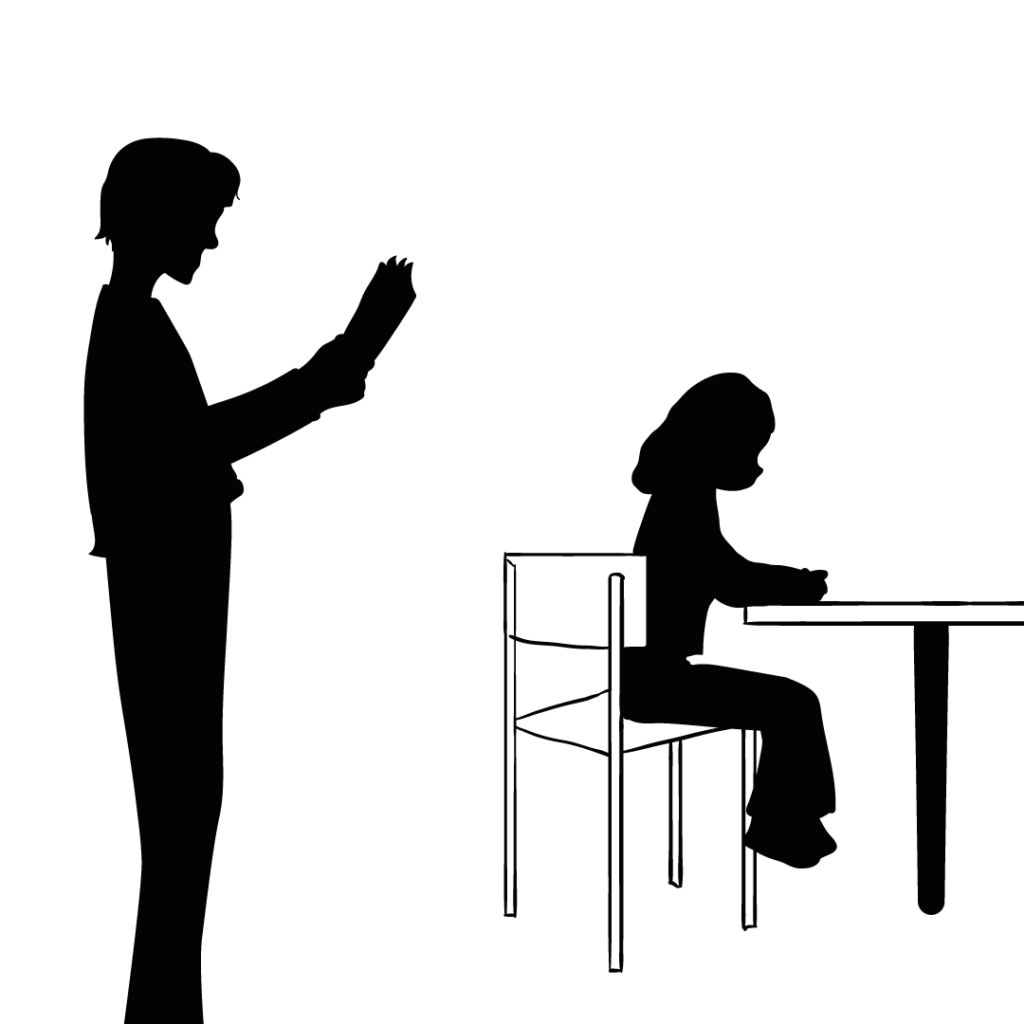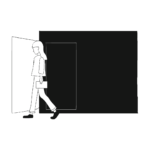THE STATE OF PRE-UNIVERSITY EDUCATION IN KOSOVO
Education is the genesis of personality, character and critical thinking capacity creation, qualities that walk with us all throughout life. Physical, linguistic, mental and socio-economical abilities have the utmost importance for the development and early care of the child. In the present educational scenario, the child should learn to go beyond the traditional method of gaining information.
Illustration: Argjira Kukaj

Not all children are born with the same opportunities. A sentence that is sad, but is also an issue that opens your eyes towards reality. The systematic ensuring of learning techniques for a majority of children, such as reading-writing has existed for 150-200 years: regardless, our children still have major stagnation in this way.
“The Convention on The Rights of The Child” compiled by the United Nations in 1989, includes the right for development, education, freedom of thought, gaining information etc, as a very important and basic issue for a country’s development and wellbeing. The Ministry of Education, Science and Technology (MEST) has a responsibility to promote a non-discriminative educational system in which the right of every person to education is respected, and where the opportunity for qualitative education is made available for everyone. But, why is it that we’re always incorrigible on writing, and we’re stuck on implementation?! Is this phenomenon a result of a cycle of problems?!
Education is the main fountain of knowledge that children are exposed to since the first step of their lives. Education contributes in the cultivation of cognitive processes, curiosity, attention to detail, mental and socio-economic development for the child, except gaining knowledge on the world and the ability to remember. We are surprised to have a large number of young unemployed people without goals or life motivation, without analyzing and understanding where the initial basis of this life impact comes from. Education is the genesis of personality, character and critical thinking capacity creation, qualities that walk with us all throughout life. Physical, linguistic, mental and socio-economical abilities have the utmost importance for the development and early care of the child. In the present educational scenario, the child should learn to go beyond the traditional method of gaining information. A child born today should possess the skills and knowledge needed only by the elite people centuries ago. They say it’s easier to create something from scratch, rather than change the base at the ending of the process. Then, where in this road of information have we taken the wrong way?! If we want the best for our children, shouldn’t the goal defeat all obstacles?!
Based on the Law for Pre-University Education- Article 6, the access and progress through all the educational and pre-university education levels is made possible in agreement with the Law for Protection from Discrimination, in existing or alleged bases, such as: gender, race, religion, sexual orientation, physical or intellectual disability, or whatever other disability, of public or other opinions, national, ethnic or social affiliation, of birth or some other state of the student or their family.
By the field research study done by Kosovar Youth Council, under the support of Save the Children, and roundtable discussions with children with special needs, children with typical development and other stakeholders by educational institutions, a series of issues and important needs have come to the surface. As a start, children have expressed that the teachers’ approach towards all the students is not the same, they show preferences in relation towards other students. While they are tolerant and listen to some students, they are aggressive in responding to even the simplest questions by others regarding the learning material.
In many cases the teachers use hateful language towards the children, thus creating an even bigger distance in the student-teacher relation, and also directly impacting on developing a child’s confidence. It’s important to mention that the issues discussed here shouldn’t be taken as a general basis for all teachers; these cases have been taken into consideration after being evident in a majority of the pre-university educational institutions in Kosovo.
In all the debates conducted with children with special needs and typical development, it was noted by the children that they need bigger learning support, but this issue doesn’t always stem by the lack of desire or will to be a bigger help to students. Despite the fact that teachers sometimes organize the students for group activities in the class, it’s impossible for them to pay special attention to each child. This consequently has an impact in more shy children to not feel included in class, and this is even more noticeable in cases of children with special needs who don’t have learning assistants. So, in most cases when a child expresses the need for support, or help in gaining information or completing some duty, it’s the classmates who come to help.
Working and concrete tools in classes are largely lacking, tools as basic and didactic as white papers, papers with colors, colored pencils, logical games, cubes and other creative tools for counting, technical-technological tools such as a projector for being current and organizing extra-curricular activities. These tools are in some cases provided by the teachers, or are created by the children themselves, despite the fact that it’s firstly a duty of the Ministry of Education, Science and Technology to provide all of the schools with necessary tools, and secondly it’s also the directive staff’s duty. In other cases, in cabinets filled with tools related to the subject (the Chemistry or Physics cabinet), students aren’t allowed to use the necessary tools to develop practical learning, on the basis that they will damage them, despite the fact that teachers are present throughout classes. On the other side, all the students interviewed by the research study of Kosovar Youth Council have expressed the need for practical learning and not only theoretical learning.
Inclusive education is one of the new reforms of Kosovo, as a new practice after the year 1999. Regardless, despite the legislative changes, Kosovo is still challenged and makes attempts towards realizing this reform. Inclusion the education has an aim of including all children without distinction of race, gender, ethnicity, disability, or some other distinction in regular classes in the nearest regular school. The Law for Inclusive Education is still being compiled, but it’s instructions are already being implemented in schools. Children with special needs go to the same classes with children with typical development in regular classes. But in order for children with special needs to most benefit out of education, they should go through a process of accurate diagnosis by a professional evaluation team.
According to the Law for Education, Article 37- Part 1, qualified people as specified by the standards in the normative act, can be chosen by the municipality in educational institutions to offer professional services, including: health care, pedagogical-psychological support and counseling or social work. When the municipal evaluation team or the school team assesses that a child needs educational support, then the Individual Education Plan is compiled for that child. The Individual Education Plan should be developed through a cooperative process, by including the school, parents, children (when suitable) and other relevant personnel.
The IEP’s main objective is to support the child’s education, so that he/she gets the most out of their abilities and potential, and/or to be educated based on a regular curriculum for as long as possible, consequently ensuring full educational inclusion. A majority of children in Kosovo are victims of non-diagnosis or misdiagnosis, the lack of compiling the IEP, and the lack of assistant teachers, which consequently impacts in the educational stagnation of the children for the educational phases that are expected to be achieved.
Despite the fact that the need for socializing can be seen as not having any basis or as unimportant, this is one of the main needs of healthy mental and physical child development, also expressed by the research study sample of Kosovar Youth Council. There are a lot of children who spend time alone, and they feel left out in learning activities. The help of teachers regarding this social phenomenon isn’t always present, but children help each other out by inviting each other to spend time or learn together. Students of all schools have accepted that they have at least one student in their class that spends time alone or is bullied by others. In some cases, the teachers help by sitting them with someone else, or by serving as mediators, but children have said that in other cases teachers don’t take any measures to change the child’s state, or even use this as a form of punishment for certain periods of time.
Socializing in school grounds is proven to be more than important for children, especially in the form of extracurricular activity. Most of primary schools in Kosovo have clubs created within the schools, such as: Mediation Club, Art Club, Sport Club, Journalism Club and even the School Radio Club. But, not all children take part in these clubs or in the activities they organize. In most cases the same students take part, and there is no motivation or push for inclusion from the teachers’ side.
By the data we have, the analysis conducted by UNICEF (2017), can be considered as one of the most inclusive documents that treats the situation of children with special needs in Kosovo. But until now, there’s still not a full number of children with disabilities in Kosovo. The situational analysis conducted by UNICEF (2017), considers children with disabilities as one of the most marginalized groups in Kosovo. More notably, according to the Ombudsperson Report (2015), the situation of children with disabilities in Kosovo is considered very unfavorable. Furthermore, Kosovo is faced with a low level of infrastructure, which consequently limits the movement of children with disabilities in educational institutions, such as in more common cases of the lack of elevators. The abovementioned problems, as implied, are a result of the lack of legislative implementation of responsible Educational Institutions.
The lack of responsibility and work by the relevant educational institutions in Kosovo is fulfilled? By the work of non-governmental organizations who aim increasing the quality of education in the country, through direct work with children, through trainings offered for teachers and the school staff, or with the providing of assistant teachers in schools where there’s a need. Regardless, the interventions made based on the projects are short-term and suffer from non-continuing after a project ends.
At this point there’s a big space for improvement in bigger investments for more long-term projects when we talk about education, because the needed changes take time to be applied and the usual techniques of responsible people in education, and simultaneously as a result of non-implementation of our educational institutions’ responsibility.
Our children have only one life, and a small opportunity to go through the right educational development at young ages. So, the demanded changes as a result of the abovementioned problems are very basic, starting from the more humane and close approach of teachers and parents with each child, up to identifying their special needs and providing a learning environment that is suitable to those needs. Our country’s future is improved only and only through an adequate and humane education, that is possible for all people in the same way.
So, the given recommendations for improving this severe educational state in Kosovo are:
Cooperation of adults and children
Trained and committed staff
A suitable learning development program with educational content
The proportions and sizes of the groups that allow the personnel to rightly cooperate with children
Supervision to ensure the quality of care
Development of staff that ensures consistence and stability
Spaces that are safe, sanitary and accessible for all children.
About the author: Rina Gosalci, 24 years old, from Pristina finished studies in Psychology.


